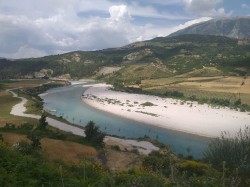Press Release, 25. September 2023
European Conference on Biodiversity and Climate Change
Experts draw up recommendations to stop the decline of wetlands in Europe
Between September 26 to 28, around 150 experts from all over Europe will come together in Bonn to discuss the role of riverine floodplains and coastal wetlands for nature and climate protection. With them, they bring the latest scientific findings and policy and practice developments and will develop recommendations for the conservation and restoration of these vital ecosystems.

Photo: Christian Hecht
"Nature conservation and climate protection must go hand in hand," explained Thomas Graner, Vice President of the German Federal Agency for Nature Conservation (BfN), who opens the conference. "That's why we are committed to nature-based solutions that benefit everyone: People, nature and climate. The conservation and restoration of riverine floodplains and coastal wetlands enable such win-win-win scenarios. After all, wetlands not only provide habitat for numerous species of animals and plants, they also store carbon, mitigate droughts, contribute to flood and coastal protection, and are a key component of our natural livelihoods."
"There is an urgent need for action to halt the decline of wetlands in Europe and strengthen their resilience to climate change," said floodplain ecologist Dr. Mathias Scholz from the Helmholtz Centre for Environmental Research (UFZ). "For this, we need to pull out all the stops: Policy reform, changes in land use and large-scale implementation of restoration measures across Europe are needed. In doing so, it is crucial that we consistently involve all affected stakeholders." Scholz is co-author of a background paper recently published by an international team of scientists for the conference, which takes an in-depth look at the role of riverine floodplains and coastal wetlands for biodiversity conservation, climate change mitigation and climate change adaptation in Europe.
The European technical conference, entitled "Riverine and Coastal Wetlands for Biodiversity and Climate," is being co-hosted by BfN and the Network of European Nature Conservation Agencies (ENCA), in close cooperation with the UFZ, the German Centre for Integrative Biodiversity Research (iDiv) and adelphi. The conference recommendations will be published at the end of the year in the form of "ENCA Recommendations".
Background
The current conference is the fifth event in the series "European Expert Conferences on Biodiversity and Climate Change", which has been organized by BfN and the ENCA network since 2011 with changing thematic foci.
Riverine floodplains and coastal wetlands are vital ecosystems for nature and people, making crucial contributions to climate change mitigation and adaptation. They are considered biodiversity hotspots and provide indispensable ecosystem services such as climate regulation, carbon sequestration, flood control, water filtration, food supply, and recreational opportunities. However, globally, inland and coastal wetlands have declined dramatically, by 35 percent between 1970 and 2015. In Germany, only 9 percent of active riverine floodplains are in a near-natural and ecologically functional state. BfN supports the restoration of these valuable ecosystems in Germany, among other things, through the floodplain funding of Germany’s Blue Belt Programme, through large-scale nature conservation projects in the chance.natur funding programme, and as the director of the new Action Programme for Natural Climate Protection.
Joint press release with the German Federal Agency for Nature Conservation
Further information
Conference website and Streaming: https://bioclim2023.adelphi.de/
Conference proceedings including program and short summaries of the presentations: https://bfn.bsz-bw.de/frontdoor/index/index/docId/1653
Background paper on the conference topic: https://www.bfn.de/publikationen/hintergrundpapier/riverine-and-coastal-wetlands-europe-biodiversity-and-climate
Further information
Dr. Mathias Scholz
Head UFZ Department of Conservation Biology & Social-Ecological Systems
mathias.scholz@ufz.de
UFZ press office
Susanne Hufe
Phone: +49 341 6025-1630
presse@ufz.de
In the Helmholtz Centre for Environmental Research (UFZ), scientists conduct research into the causes and consequences of far-reaching environmental changes. Their areas of study cover water resources, ecosystems of the future, environmental technologies and biotechnologies, the effects of chemicals in the environment, modelling and social-scientific issues. The UFZ employs more than 1,100 staff at its sites in Leipzig, Halle and Magdeburg. It is funded by the Federal Government, Saxony and Saxony-Anhalt.
www.ufz.deThe Helmholtz Association contributes to solving major challenges facing society, science and the economy with top scientific achievements in six research fields: Energy; Earth and Environment; Health; Key Technologies; Matter; and Aeronautics, Space and Transport. With some 39,000 employees in 19 research centres, the Helmholtz Association is Germany’s largest scientific organisation.
www.helmholtz.de